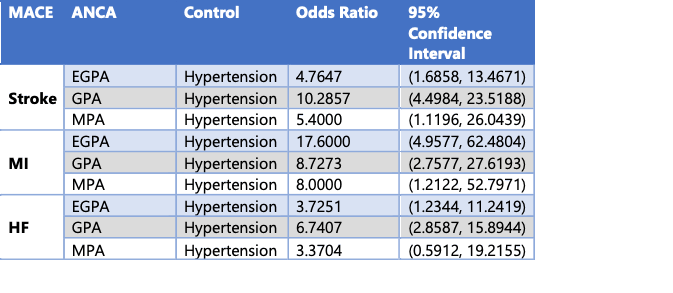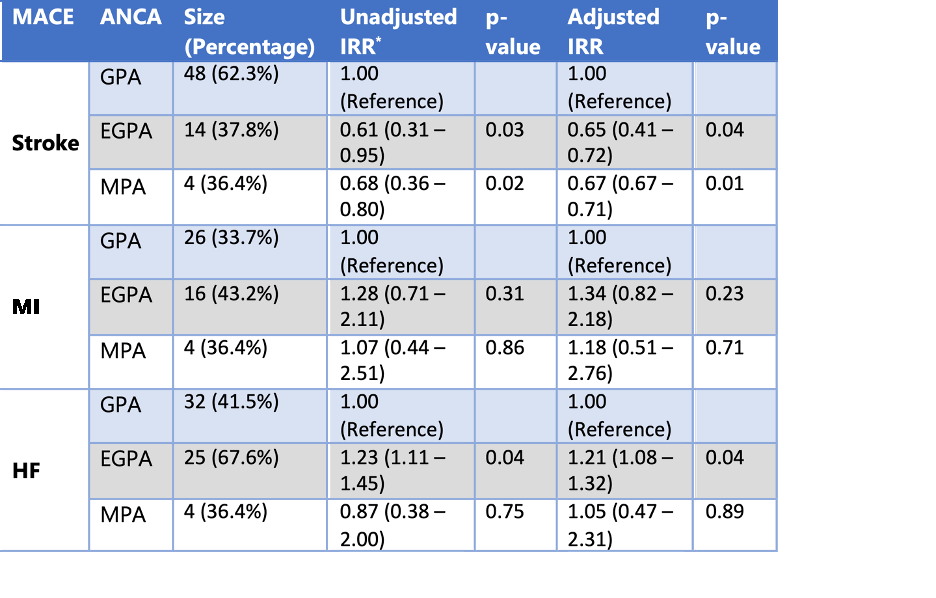Session Information
Date: Tuesday, November 14, 2023
Title: (2370–2386) Vasculitis – ANCA-Associated Poster III: Biomarkers & Renal Outcomes
Session Type: Poster Session C
Session Time: 9:00AM-11:00AM
Background/Purpose: Vascular damage from inflammation in ANCA vasculitis leads to a sustained procoagulant state causing accelerated atherosclerosis. A population-based cohort study found that the risk of cardiovascular disease is more than 3-fold higher in patients with ANCA-associated vasculitis. We hypothesize that those with ANCA vasculitis are more likely to have a major adverse cardiovascular event (MACE) compared to those in the hypertension control group.
Methods: We retrospectively reviewed patients with ANCA vasculitis (n=125) between 2017-2020. Charts were reviewed to assess cardiovascular (CV) risk factors which included history of smoking, hypertension, hyperlipidemia, diabetes mellitus and chronic kidney disease. Incidence of MACE such as myocardial infarction (MI), stroke, heart failure (HF) was calculated retrospectively after the diagnosis of ANCA vasculitis. Chi square and modified Poisson regression were used to calculate the incidence rate ratio (IRR) for MACE. We also retrospectively reviewed patients with hypertension without ANCA-associated vasculitis (n=100) between 2017-2020. The associations of each of the ANCA vasculitis categories and hypertension group with outcomes of MACE were examined by logistic regression. Minitab statistical software was used with significance accepted at p < 0.05.
Results: The mean age of the hypertension group was 62 years with a mean BMI of 30.1 kg/m². Females were 48%. The odds of having a stroke and MI were significantly higher amongst EGPA, GPA, and MPA patients than hypertension patients (p< 0.05). The odds of having HF were significantly higher amongst EGPA and GPA patients than hypertension patients (p< 0.05) [Table 1].
Of 125 total ANCA vasculitis patients, 77 (61.6%) had granulomatosis with polyangiitis (GPA), 37 (29.6%) had eosinophilic granulomatosis with polyangiitis (EGPA), and 11 (8.8%) had microscopic polyangiitis (MPA). Females were 68%. Mean age of the cohort was 58 years with a mean BMI of 29.4 kg/m². The unadjusted and adjusted (for age, gender, and CV risk factors) IRR for stroke was significantly lower in patients with EGPA and MPA vs. GPA (p< 0.05). The IRR for HF was significantly higher in EGPA vs. GPA (p< 0.05) [Table 2].
Conclusion: ANCA-associated vasculitis is a significant risk factor of MACE. The hypertension control group may not be a true matched control group. The ANCA vasculitis group may have other comorbidities including, diabetes, hyperlipidemia, chronic kidney disease, and tobacco abuse. More studies are needed to show that control of ANCA disease activity can decrease the risk of MACE and death. More studies are needed to show that treatment of modifiable risk factors including, glucocorticoid use, chronic kidney disease (CKD), proteinuria, respiratory infections, dyslipidemia, hypertension, metabolic syndrome, and insulin intolerance is necessary to optimize long-term outcomes.
To cite this abstract in AMA style:
Rosenberg L, Farrukh L, Kooner S, Ehtesham M, Wajid S, Peredo-Wende R, Murawski S. Major Cardiovascular Adverse Events in Patients with ANCA Vasculitis Compared with Hypertension Control Group [abstract]. Arthritis Rheumatol. 2023; 75 (suppl 9). https://acrabstracts.org/abstract/major-cardiovascular-adverse-events-in-patients-with-anca-vasculitis-compared-with-hypertension-control-group/. Accessed .« Back to ACR Convergence 2023
ACR Meeting Abstracts - https://acrabstracts.org/abstract/major-cardiovascular-adverse-events-in-patients-with-anca-vasculitis-compared-with-hypertension-control-group/


